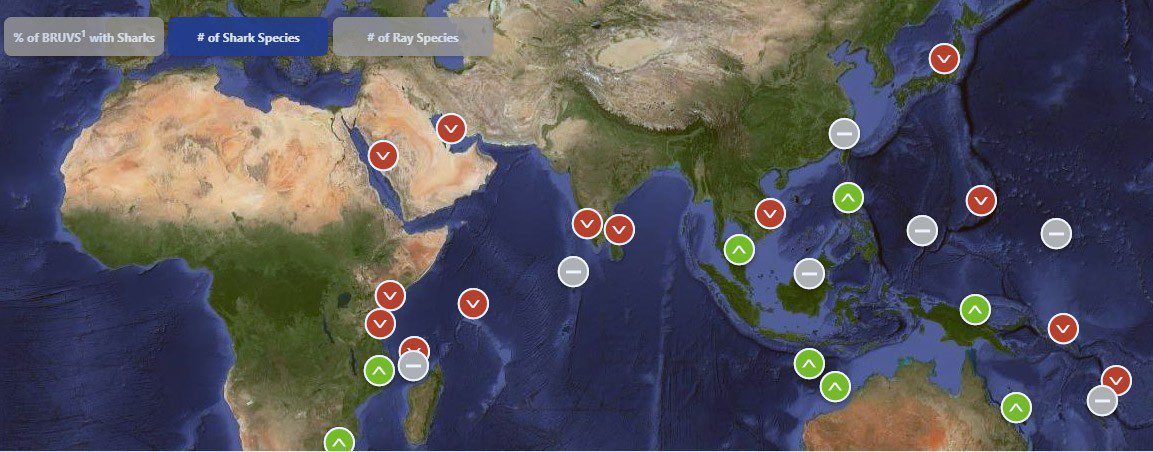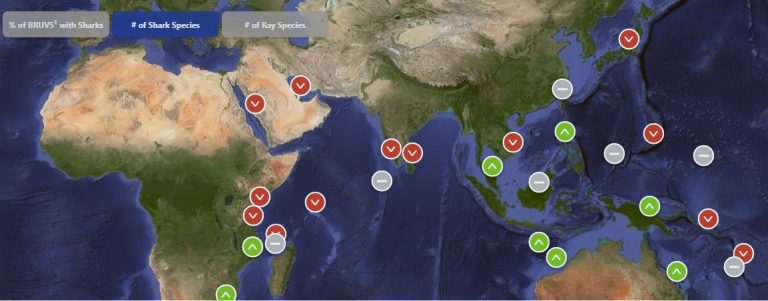DIVING NEWS
Zero sharks on fifth of reefs

Picture: Global FinPrint.
Sharks have become too rare on many of the world’s coral reefs to fulfil their normal role in the ecosystem. So say scientists behind Global FinPrint, described as the world’s largest reef shark and ray survey, concluding that the sharks have been rendered “functionally extinct”.
No sharks at all were observed on almost a fifth of 371 reefs surveyed in 58 countries, indicating “a widespread decline that has gone undocumented on this scale until now”.
However the 120-strong survey team, led by researchers at Florida International University, also identified parts of the world in which they say conservation is succeeding, and the measures that could turn the tide elsewhere.
Launched in 2015, Global FinPrint involved the deployment of 30-100 “chum cams” – baited remote underwater video systems – on each reef for an hour at a time to record the marine life present. More than 20,000 hours of footage was recorded.
Behind the initiative was Microsoft co-founder the late Paul G Allen, who also began the successful Vulcan Inc deep-wreck-hunting expeditions of recent years.
Global FinPrint observers focused on western Atlantic, Indian Ocean, western Pacific and central Pacific reefs, co-ordinated by Florida International, Curtin, Dalhousie and James Cook universities and the Australian Institute of Marine Science..
No more than three sharks in total were found on all the coral reefs surveyed across the Dominican Republic, French Antilles (Guadeloupe, Martinique, St Martin & St Barthelemy) and Qatar. Their absence was ascribed mainly to overfishing, and particularly the use of destructive methods such as longlines and gill-nets.
However, the study also revealed those nations in which shark conservation was said to be working. Best-performing compared to the average of their regions were Australia, the Bahamas, the Federated States of Micronesia, French Polynesia, the Maldives and the USA.
“These nations are seeing more sharks in their waters because they have demonstrated good governance on this issue,” said Aaron MacNeil, lead author of the Global FinPrint study, now published in Nature.
“From restricting certain gear types and setting catch limits, to national-scale bans on catches and trade, we now have a clear picture of what can be done to limit catches of reef sharks throughout the tropics.”
“The data collected from the first-ever worldwide survey of sharks on coral reefs can guide meaningful, long-term conservation plans for protecting the reef sharks that remain.” An interactive world map derived from the Global FinPrint survey results can be found here. < https://globalfinprint.org >
28 July 2020
“Now that the survey is complete, we are also investigating how the loss of sharks can destabilise reef ecosystems,” said study co-lead Mike Heithaus. “At a time when corals are struggling to survive in a changing climate, losing reef sharks could have dire long-term consequences for entire reef systems.”
“While Global FinPrint results exposed a tragic loss of sharks from many of the world’s reefs, it also shows us signs of hope,” said Jody Allen, co-founder and chair of the Paul G Allen Family Foundation.

